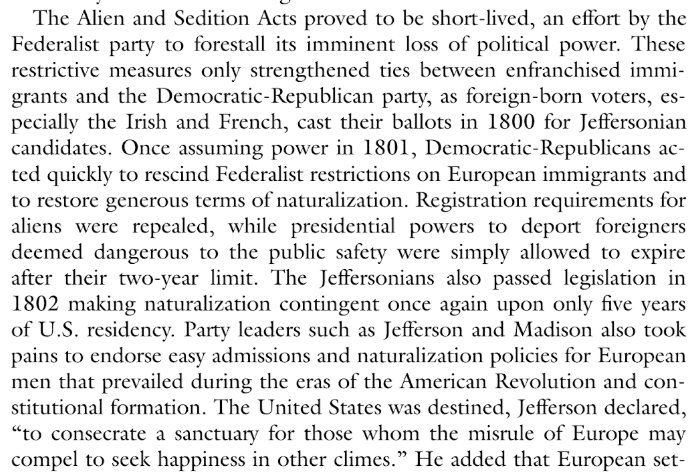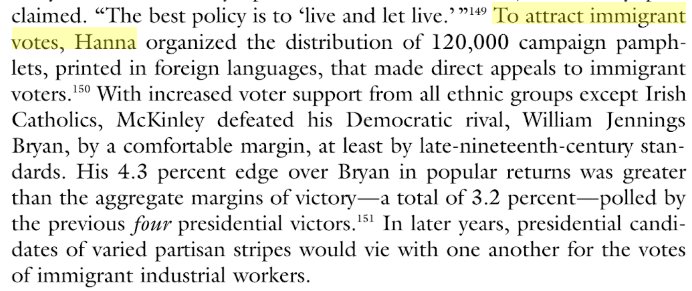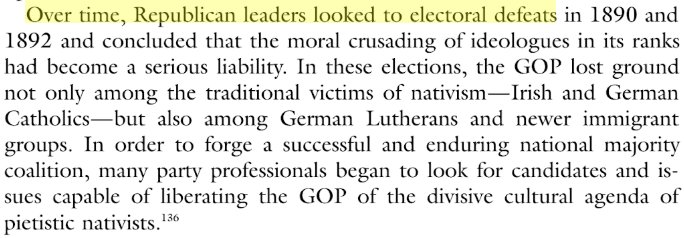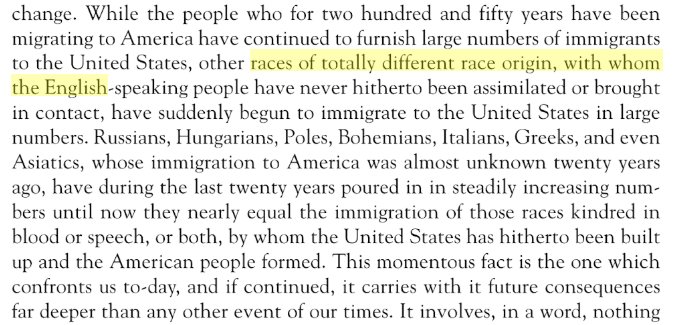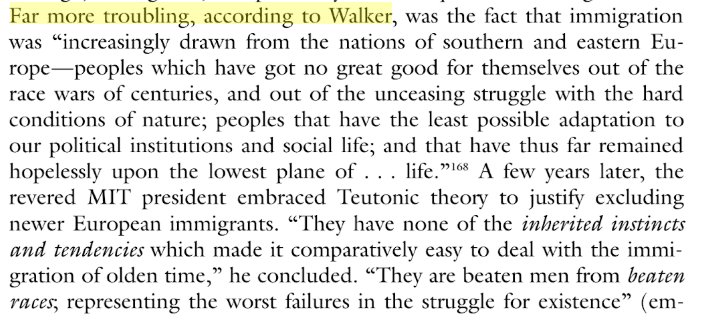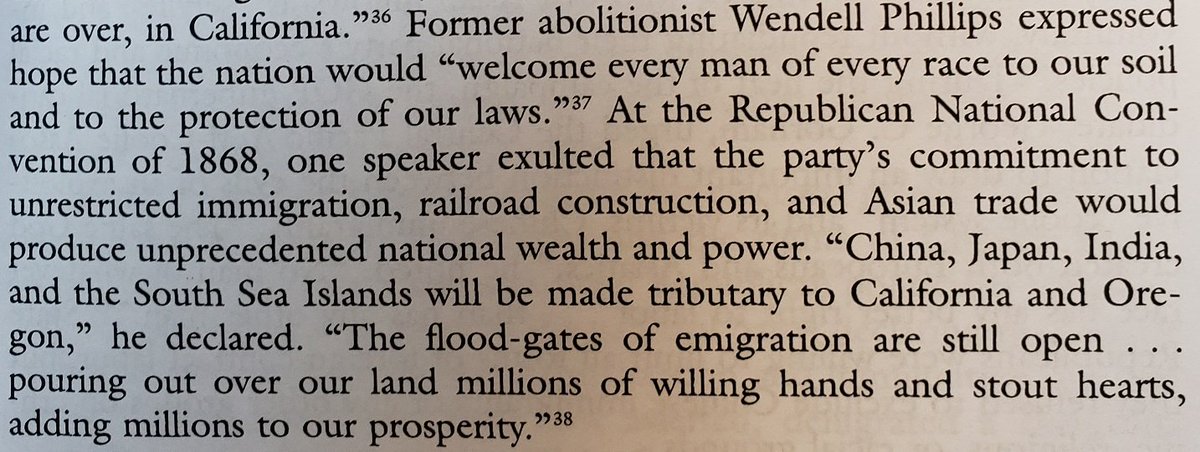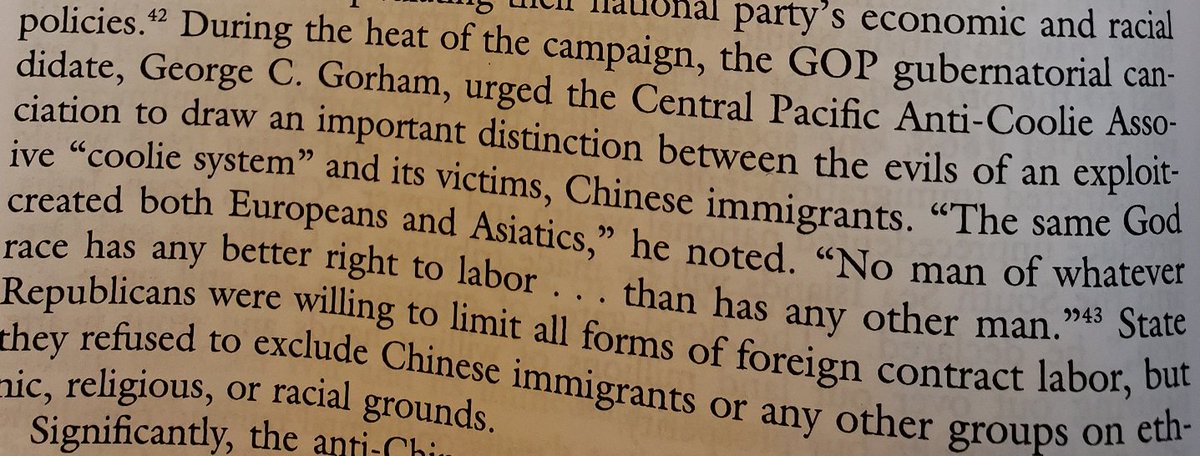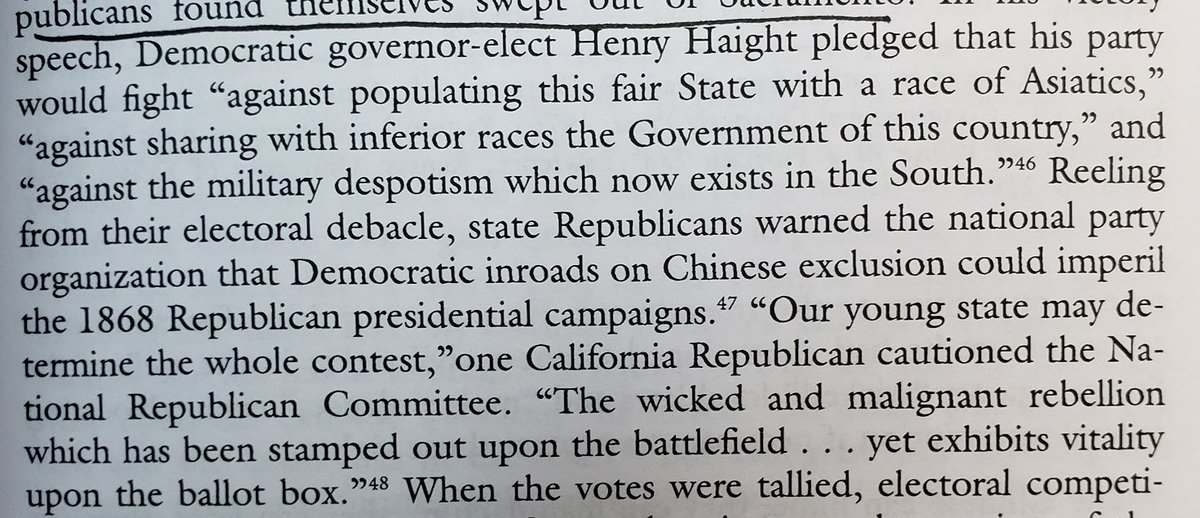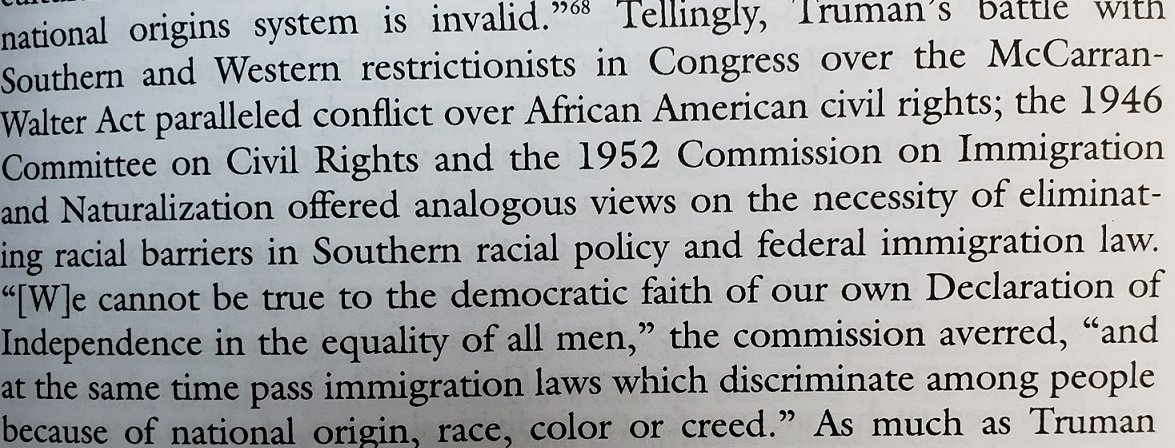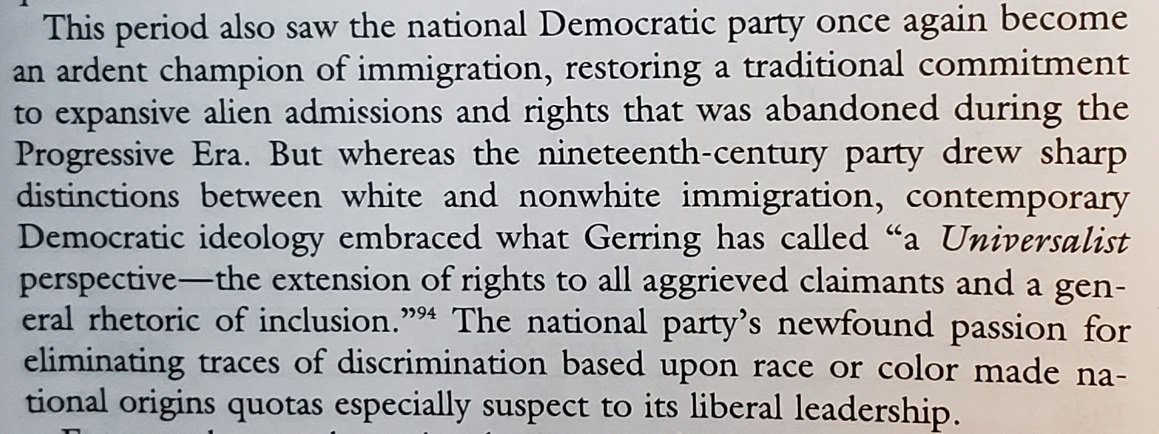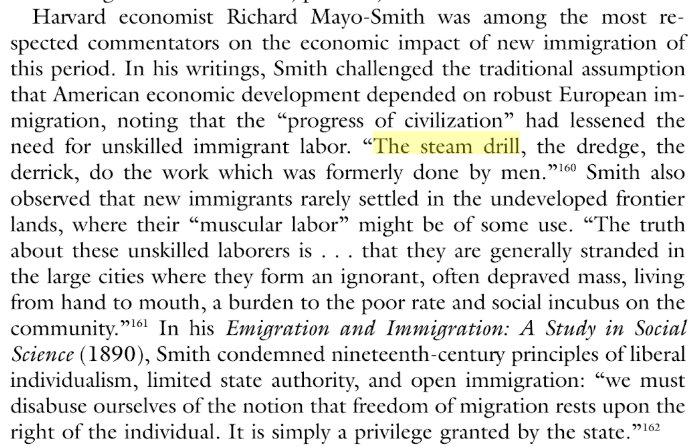1/Since Trump's demand for his Wall is in the headlines, I thought it would be a good time for a thread about a history book I just read:
"Dividing Lines: The Politics of Immigration Control in America", by Daniel Tichenor (2002) https://www.amazon.com/Dividing-Lines-Immigration-International-Perspectives/dp/0691088055
"Dividing Lines: The Politics of Immigration Control in America", by Daniel Tichenor (2002) https://www.amazon.com/Dividing-Lines-Immigration-International-Perspectives/dp/0691088055
2/The book starts out with a chapter or two of dense, unnecessary political science jargon, saying that - essentially - U.S. immigration policy tends to move very slowly, because powerful politicians and officials resist the tide of public opinion.
3/But most of the book is an extremely readable, eye-opening history of U.S. immigration policy, from the founding through the 1990s.
It shows how the immigration debates we're now having have been with us, in some form or another, for a very long time.
It shows how the immigration debates we're now having have been with us, in some form or another, for a very long time.
4/One interesting bit of history is how Whigs and Federalists thought that the Democrats were importing immigrants in order to import votes in the early 1800s.
Kind of like the Republicans think the Dems are doing today!
Kind of like the Republicans think the Dems are doing today!
5/In fact, importing votes basically worked. Irish (and to a lesser extent German) immigrants reliably voted Dem, leading to Democratic electoral victories!
Democrats then kept immigration laws liberal, leading to more immigration, and the cycle repeated.
Democrats then kept immigration laws liberal, leading to more immigration, and the cycle repeated.
6/What did the Dems' opponents do in response?
Did they embrace Trump-like figures and cut off immigration?
No! They courted immigrant votes themselves! Sometimes with great success.
Did they embrace Trump-like figures and cut off immigration?
No! They courted immigrant votes themselves! Sometimes with great success.
7/In the 1800s, there was basically a cycle. Nativists would get mad about immigration, there would be a wave of populist anger, but politicians would be too scared of alienating the immigrant vote and wouldn't restrict immigration. Eventually each populist wave died down.
8/What broke this cycle?
Racism.
In the 1870s and 1880s, California nativists finally hit on a winning formula. They passed laws barring Chinese immigrants from voting, on account of their race. This let them pass Chinese exclusion without organized opposition.
Racism.
In the 1870s and 1880s, California nativists finally hit on a winning formula. They passed laws barring Chinese immigrants from voting, on account of their race. This let them pass Chinese exclusion without organized opposition.
9/In the early 1900s, this idea went national. Nativists looking to restrict European immigration brought in "experts" who argued that South and East Europeans were different races than North and West Europeans.
10/Read this argument about East and South Europeans from a century ago, and tell me if it doesn't sound like alt-right arguments from the modern day:
11/Elite racists - the Immigration Restriction League - worked behind closed doors to use "race science" and eugenics theory to convince politicians that South and East European immigrants (and of course, Asians) represented a racial threat to America and had to be stopped.
12/You can read more about this episode in John Higham's "Strangers in the Land", which I wrote a thread about one year ago: https://twitter.com/Noahpinion/status/937022302721474560
13/Anyway, immigration restriction worked in the 1920s, and due to the institutional inertia Tichenor describes, it took liberals decades to dismantle it after WW2 turned elite opinion against Nazi-esque ideas. Hence, we didn't get immigration reform til 1965.
14/Now, some people argue that America never considered nonwhite immigrants to be equal to white immigrants. But there was at least one group who did!
Those were the Radical Republicans of the post-Civil War era. They were basically the SJWs of their day.
Those were the Radical Republicans of the post-Civil War era. They were basically the SJWs of their day.
15/The Civil War produced a burst of universalist racial egalitarianism among the Republicans. (Sadly it died out relatively quickly after Reconstruction failed.)
16/As always throughout American history, the Declaration of Independence was the rallying point for racial egalitarians and universalists.
Jefferson's fateful words continue to echo down through the ages...
Jefferson's fateful words continue to echo down through the ages...
17/How about the big immigration liberalization after WW2?
The now-common cynical view is that America did this only in order to compete morally with the USSR. And in fact that competition was often invoked by people who wanted to liberalize immigration...
The now-common cynical view is that America did this only in order to compete morally with the USSR. And in fact that competition was often invoked by people who wanted to liberalize immigration...
18/But just as important was the change in elite opinion caused by the Nazis.
The Nazi example convinced Democratic party leaders to start adopting a racial universalism that was unthinkable before the war.
The Nazi example convinced Democratic party leaders to start adopting a racial universalism that was unthinkable before the war.
20/Basically, the experience of winning WW2 started the Democratic Party on the path toward becoming anti-racists. And immigration reform was part of that.
21/So in the 19th century, immigration arguments were about partisan conflict and the importing of votes.
In the late 19th and 20th centuries, immigration arguments were about race.
Now, in the 21st century, it's about both. The two arguments have merged.
In the late 19th and 20th centuries, immigration arguments were about race.
Now, in the 21st century, it's about both. The two arguments have merged.
22/Of course, there have always been economic arguments as well.
This argument from 100 years ago, that immigrant labor was unnecessary due to automation, sounds just like something out of @reihan's book:
This argument from 100 years ago, that immigrant labor was unnecessary due to automation, sounds just like something out of @reihan's book:
23/And the fight over Mexican immigration was, for many decades, mostly about economics rather than race or vote-importing. That debate proceeded in parallel to the bigger, more contentious fights over European and Asian immigration.
24/In fact, the economic character of the debate over Mexican immigration led to some very bizarre political coalitions.
Here's a quote from CESAR CHAVEZ that made me blink in amazement:
Here's a quote from CESAR CHAVEZ that made me blink in amazement:
25/But it seems clear that the debate over Latin American immigration and illegal immigration across the Mexican border is now no longer about economics.
Now, it's about race and electoral politics, much as debates over Irish and Italian immigration in centuries past.
Now, it's about race and electoral politics, much as debates over Irish and Italian immigration in centuries past.
26/Anyway, Tichenor's book is evidence that the more immigration debates change, the more they stay the same.
Trump is not a new thing. He's just an ugly new manifestation of several old things.
Trump is not a new thing. He's just an ugly new manifestation of several old things.
27/Immigration and immigration policy have ALWAYS defined the evolution of the American nation.
Debates over immigration have ALWAYS been central to our society, our politics, and our self-conception as a people.
This war will never end, because this war is who we are.
(end)
Debates over immigration have ALWAYS been central to our society, our politics, and our self-conception as a people.
This war will never end, because this war is who we are.
(end)

 Read on Twitter
Read on Twitter
